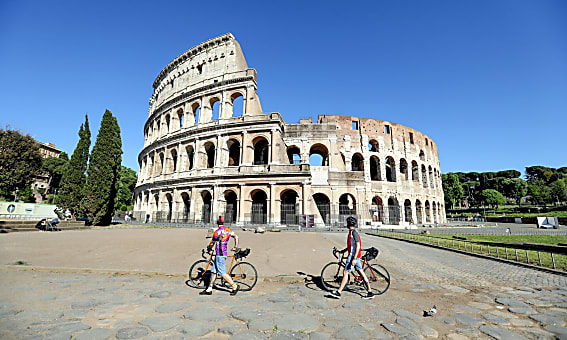
(Bloomberg) --
Governments everywhere are walking a fine line between protecting their citizens and preserving their economies during the coronavirus pandemic. That line may be shifting as the economic pressure rises.
Germany and New Zealand are among countries rolling back restrictions as infections and deaths decline. But the picture is less clear-cut elsewhere.
U.K. Prime Minister Boris Johnson told lawmakers yesterday he hoped to start relaxing Britain’s lockdown from Monday, even as 648 additional deaths made his the first European nation to record more than 30,000 fatalities from the pandemic.
Russian President Vladimir Putin gave regional governors a green light to begin cautiously easing stay-at-home measures from May 12, after officials told him economic activity had slumped 33% during the lockdown. Russia reported a record 11,231 new cases today, overtaking Germany in total infections.
President Donald Trump decisively focused the federal government's efforts this week toward reopening the U.S. economy, even as he acknowledged the price may be more deaths. With the greatest number of fatalities of any country — 71,000 and counting — Trump rejected a Johns Hopkins University analysis showing the daily death toll could reach 3,000 by June 1.
To be sure, keeping economies locked down also can carry a price in lives and livelihoods.
As the cost and damage mount, other leaders will be confronting the same calculation that Trump tackled openly in acknowledging that some people would “be affected badly” but “we have to get our country open.” What level of coronavirus deaths are Americans and citizens of other nations willing to tolerate to return to some sort of normality?
Global Headlines
Talking again | Chinese Vice Premier Liu He and U.S. Trade Representative Robert Lighthizer will speak as soon as next week on progress in implementing a phase-one trade deal that Trump threatened to “terminate” if Beijing wasn’t adhering to its terms. The planned phone call will be the first time Liu and Lighthizer officially discuss the agreement since it was signed in January.
- The World Health Organization is considering a new mission to seek the source of the coronavirus in China, amid growing controversy over the pandemic’s origin.
Polling pause | Poland will delay Sunday’s presidential election for several months, bowing to concerns that holding it during the height of the pandemic may not be free or fair. The government is sticking to a plan to conduct polling solely via mail, an untested process election monitors say is vulnerable to fraud.
Investment push | India is seeking to lure U.S. businesses to relocate from China as the Trump administration steps up efforts to blame Beijing for its role in the pandemic. The government has reached out to more than 1,000 companies to offer incentives for manufacturers, including solutions to stalled land and labor reforms that have held back the country’s foreign investment push. But nationwide protests and slow growth are two major risks for companies planning to move.
China alone | President Xi Jinping has pledged that his Belt and Road program of overseas investment and construction will be green and sustainable. The reality is that Chinese state-owned companies are pumping money into coal projects across Africa, even as most of the world turns away from fossil fuels. That leaves Beijing ploughing a lonely furrow on coal at a time of growing global suspicion of its handling of the coronavirus outbreak.
Bolsonaro’s challenger | Brazilian politics is not for the faint of heart. Just ask Sergio Moro, a star judge who resigned as justice minister accusing President Jair Bolsonaro of attempting to interfere in police investigations. Moro made his name presiding over the Carwash probe that brought down a string of corrupt business leaders and politicians. As Simone Iglesias and Samy Adghirno report, he could pose a real threat to Bolsonaro, legally but also politically, since Moro is being touted as a potential presidential candidate in 2022.What to Watch
- The U.S. Senate is set to vote today on overriding Trump’s veto of legislation that would require his administration to seek clearance from Congress for any military action against Iran.
- Israeli Prime Minister Benjamin Netanyahu can form a government despite the corruption charges against him, the country’s highest court said in a ruling that paves the way to ending more than a year of political stalemate.
- French Prime Minister Edouard Philippe is to unveil final details of his plan to end curbs on public life later today.
Tell us how we’re doing or what we’re missing at balancepower@bloomberg.net.And finally ... They must sit close to coworkers for hours on end. Social distancing from strangers — their customers — is nearly impossible. After work they head for nearly deserted hotels and scrounge for places to buy food. Thousands of pilots and flight attendants risk exposing themselves to the coronavirus on a daily basis, and unions are frustrated at the U.S. government’s unwillingness to mandate standards and what they say is a failure of the airlines to heed health authorities’ recommendations. And, as Alan Levin reports, reopening the economy could entice people back to flying, increasing the risk.
For more articles like this, please visit us at bloomberg.com
©2020 Bloomberg L.P.